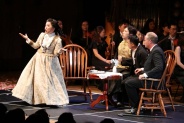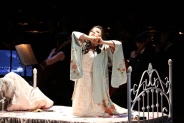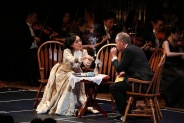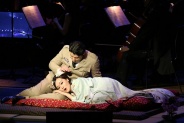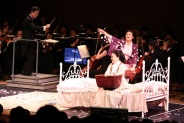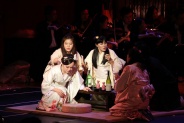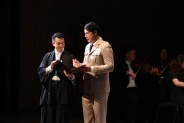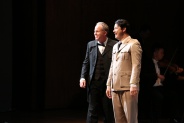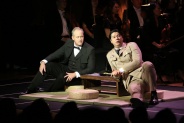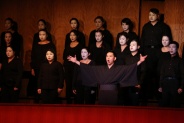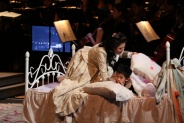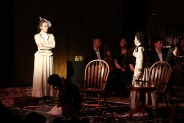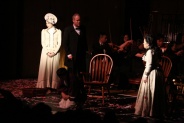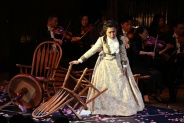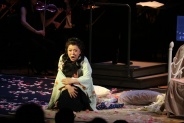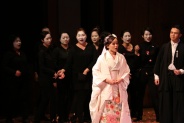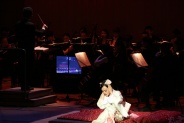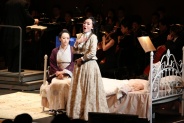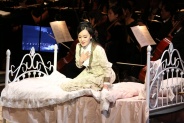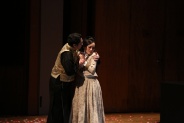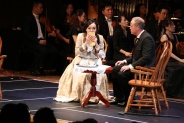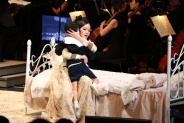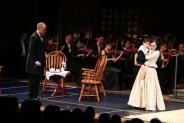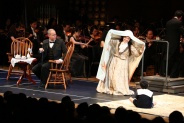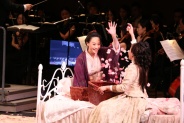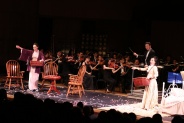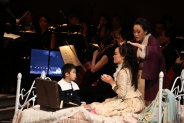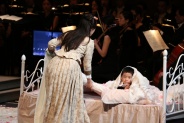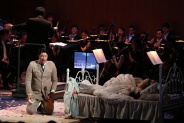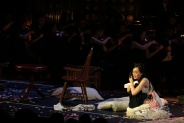Madama Butterfly
Madama Butterfly realised for Hong Kong OperaMadama Butterfly
Butterfly belongs neither to the East nor to the West – a particular interpretation that brings the opera into the modern dilemma of many women today. Butterfly has lost her roots with the East, but yet she has never been part of the West as she always wished to be. She can’t go back to the East because her family and her culture disowned her, so instead she latches onto a future with her fictive husband, but she soon has to realise that her fantasy has finished and her marriage was only the amusement of a Yankee. Around the beginning of the century, the old, patriarcal order of Samurai which exhibited the force of feudal authority had lost their relevance and power due to increasing Western influences. The aggressive Westernisation declassed both Japanese wisdom and tradition. Butterfly was born during this upheaval. She recognises neither the old tradition nor the emerging corrupted Japanese society: Cio-Cio San lives in a culture in which selling her body as geisha is acceptable but falling in love with a foreigner is socially taboo.
The events of the opera are simply too much for the fifteen-year-old to cope with. She therefore creates in her mind the fantasy of the marriage with Pinkerton, imagining him to be returning soon and that she herself is a respectable American woman. Butterfly must fight against the western cliché of a Japanese woman – a compliant being, the natural beauty in a kimono – as she doesn’t identify herself with it. She wants to destroy what is the symbol of the Japanese woman at the beginning of last century, namely a puppet, an attraction, merely a divertissement, and to become a real woman, a Western woman. Butterfly therefore tries desperately to identify herself in the female imagery of Western culture, idealising it. After her wedding, which is her farewell to her culture, religion, tradition, a farewell to the East, she behaves like an American woman, she changes her look and the furniture of her little house, she goes to church instead that to the temple, she reads the Bible, she teaches her son English, she cooks Western food. The people of Japan ridicule her and some of her acquaintances suggest her to marry a rich man. Only when she is in front of Kate, a blonde American woman, the real wife of Pinkerton, she realises she has been living in a fantasy. There is no future for her either in the East or in the West and she has to annihilate herself.
Press comments
This semi-staged production by Italian director Pamela Recinella left one wondering exactly why one needs the full sets and stage business that may add spectacle but also a great deal of cost. The relatively intimate setting of the Hong Kong City Hall resulted in a performance that seemed to owe as much to theatre as opera. Recinella makes much of Butterfly’s pretending to be American. She pulls out a bible; her American clothing is a costume; she takes a cigarette for herself after offering one to Sharpless. There are chairs, table with a doily, a wrought-iron bed. The compressed stage—the orchestra was behind—added to the oppressiveness of suppressed emotion; this was Puccini by way of Chekhov.
Peter Gordon is editor of The Asian Review of Books.
One that loved not wisely. A new edition of Puccini's Madama Butterfly will play up the unresolvable conflict between selfhood and falling in love with the wrong man. For Recinella, in spite of the explorations of exoticism, race, gender and sexual exploitation, "the opera concentrates on Butterfly's feelings and the dramatic and unresolvable conflict between her identity and her true love that leads her to delusion and to death."
ChinadailyAsia

